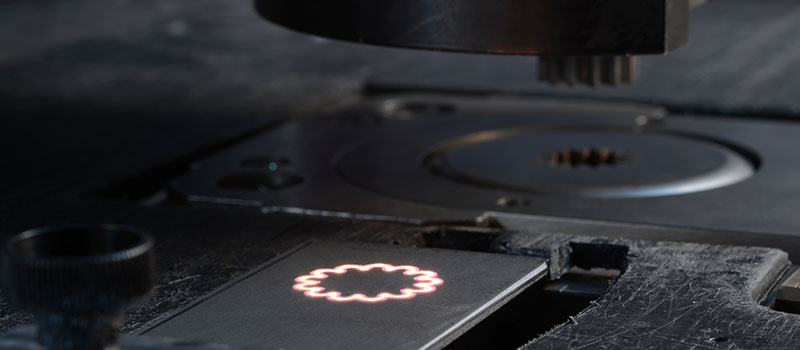Conventional sheet metal processing methods such as shear cutting or forming often reach their limits with high-performance materials. For example, perfect cut edges are difficult to achieve in transfer and progressive dies for high-strength sheets of steel, titanium or aluminum. New manufacturing technologies are therefore required to meet increasing production and quality demands. Functional integrations, for example high local strength or formed structures in the component, can be realized by local hardening or heating.
Efficient sheet metal processing in the progressive die
The Fraunhofer IPT developed technologies for local, thermal-assisted sheet metal processing (tailored heat) in the manufacturing process. Integrated into transfer or progressive dies, this allows high-strength sheet metal can be heated locally for a short time before processing. As a result, the materials can be more easily formed or cut in critical areas of the component. Conventional machine and tooling technologies achieve higher cutting qualities and forming degrees with thermal support, and conventional process limits can be extended.
Previous research results on shear cutting show that clear cut percentages of up to 100 percent can be achieved with local heating. At the same time, the cutting forces are reduced by up to 70 percent compared to the conventional cold process. With flange forming, doubled expansion ratios are possible. Local laser heating also offers advantages in bending, embossing and deep drawing: Using a high-strength spring steel, the smallest bending radii and large drawing and stamping depths were achieved. With suitable temperature control for the respective material, locally hardened sheet metal components can also be produced in the progressive die.
Individual solutions for sheet metal processing
The Fraunhofer IPT develops heating processes suitable for series production for your individual sheet metal components and materials. In addition to fundamental know-how in laser system technology, sheet metal processing and materials engineering, modern heating systems and press technology are available for feasibility tests up to pilot series production according to current industrial standards. Metallographic material analysis completes the range of services.
Sheet metal components for fuel cells and electrolysers
One application for sheet metal processing is the production of components, metal-based bipolar plates and expanded metal structures. Expanded metal Structures are mainly used in electrolysis in combination with flat bipolar plates, which can achieve significant cost advantages compared to conventional porous transport layers. The Fraunhofer IPT is working on the efficient and functional production of the structures. The flat joining of the expanded metals is realized by means of medium-frequency resistance pressure welding.



